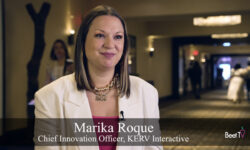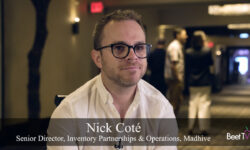In the fast-paced world of marketing, where complexity and change are the only constants, there’s a relentless search for the next big idea that can propel the industry forward.
An exclusive event organized for chief marketing officers by chief marketing officers aims to do just that, by exploring the art of possibilities and evolving the industry.
POSSIBLE takes place in Miami in April 15-17. Greg Stuart, the co-founder of the event, explains the approach in this video interview with Beet.TV.
The Birth of POSSIBLE: A CMO’s Haven
“At the core, POSSIBLE is about what can be new and different,” says Stuart. “We just didn’t see a place where buyers and sellers, which is the essence of the MMA, come together at one time to really evolve our industry and become better than we are currently.”
Stuart pinpoints the issue many marketers face: being “too busy to do better.” To combat this, POSSIBLE and the MMA offer a platform for identifying opportunities that often go unnoticed or unexplored due to a lack of time, budget, or inclination.
The event showcases “revolutionary new research,” according to Stuart, such as growth frameworks, measurement techniques, and the value of branding in ways previously undefined. He shares an intriguing comparison to illustrate the status quo’s inefficiency: “I believe marketing is no further along than the medical profession was in the mid-1800s when they thought the answer for health and wealth was bloodletting.”
BREAKING NEWS!! Announcing award-winning musician, actor, & producer @janellemonae will be a special guest at @POSSIBLEevent! Janelle will share her unique perspective about the entertainment business and how she transcends her personal #brand. Read more: https://t.co/nY6knp6bo1 pic.twitter.com/qCegqhMsrv
— PossibleEvent (@PossibleEvent) March 29, 2024
The Long Road to Marketing Evolution
Looking ahead, Stuart sees a journey spanning more than a year, where marketers collectively strive to understand the frameworks for growth and the role of organizational structure in driving sales. He praises companies like Kroger and T-Mobile for aggressively leaning into the future, embodying the very essence of what POSSIBLE stands for.
“A year from now, I’d like us to all understand growth frameworks because most marketers don’t,” Stuart envisions. He also touches on the importance of AI, revealing that ongoing experiments have led to gains in digital marketing performance by an average of 195%. However, he candidly shares that not all attempts are successful, emphasizing the value of learning from failures.
Stuart also hints at the development of the ability to measure a company’s marketing efficacy using publicly available data. “We can rank companies on their marketing gravitas, efficiency, strength, using independent data,” he explains. This could link marketing’s contribution to market valuation, offering CMOs a powerful tool when communicating with the board and C-suite.














































